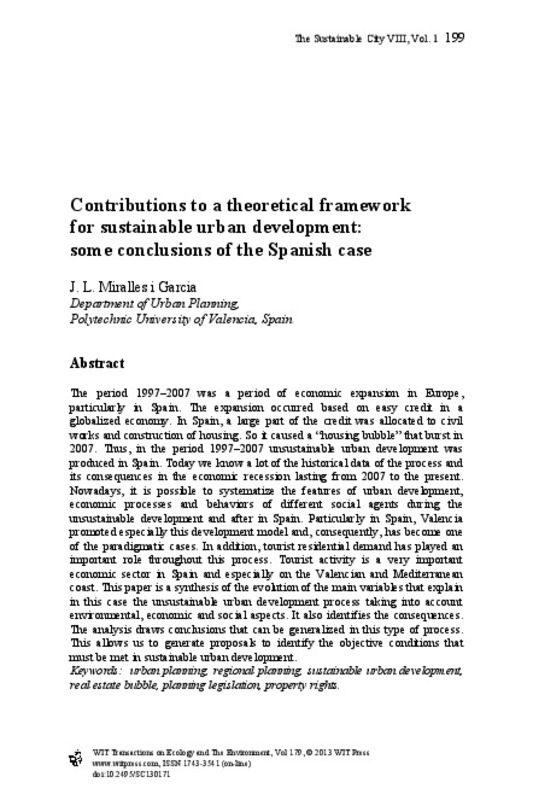JavaScript is disabled for your browser. Some features of this site may not work without it.
Buscar en RiuNet
Listar
Mi cuenta
Estadísticas
Ayuda RiuNet
Admin. UPV
Contributions to a theoretical framework for sustainable urban development: some conclusions of the Spanish case
Mostrar el registro sencillo del ítem
Ficheros en el ítem
| dc.contributor.author | Miralles García, José Luis
|
es_ES |
| dc.date.accessioned | 2015-05-27T11:10:59Z | |
| dc.date.available | 2015-05-27T11:10:59Z | |
| dc.date.issued | 2013 | |
| dc.identifier.issn | 1743-3541 | |
| dc.identifier.uri | http://hdl.handle.net/10251/50847 | |
| dc.description.abstract | The period 1997 2007 was a period of economic expansion in Europe, particularly in Spain. The expansion occurred based on easy credit in a globalized economy. In Spain, a large part of the credit was allocated to civil works and construction of housing. So it caused a housing bubble that burst in 2007. Thus, in the period 1997 2007 unsustainable urban development was produced in Spain. Today we know a lot of the historical data of the process and its consequences in the economic recession lasting from 2007 to the present. Nowadays, it is possible to systematize the features of urban development, economic processes and behaviors of different social agents during the unsustainable development and after in Spain. Particularly in Spain, Valencia promoted especially this development model and, consequently, has become one of the paradigmatic cases. In addition, tourist residential demand has played an important role throughout this process. Tourist activity is a very important economic sector in Spain and especially on the Valencian and Mediterranean coast. This paper is a synthesis of the evolution of the main variables that explain in this case the unsustainable urban development process taking into account environmental, economic and social aspects. It also identifies the consequences. The analysis draws conclusions that can be generalized in this type of process. This allows us to generate proposals to identify the objective conditions that must be met in sustainable urban development. | es_ES |
| dc.language | Inglés | es_ES |
| dc.publisher | WITPress | es_ES |
| dc.relation.ispartof | WIT Transactions on Ecology and the Environment | es_ES |
| dc.rights | Reserva de todos los derechos | es_ES |
| dc.subject | Urban planning | es_ES |
| dc.subject | Regional planning | es_ES |
| dc.subject | Sustainable urban development | es_ES |
| dc.subject | Real estate bubble | es_ES |
| dc.subject | Planning legislation | es_ES |
| dc.subject | Property rights | es_ES |
| dc.subject.classification | URBANISTICA Y ORDENACION DEL TERRITORIO | es_ES |
| dc.title | Contributions to a theoretical framework for sustainable urban development: some conclusions of the Spanish case | es_ES |
| dc.type | Artículo | es_ES |
| dc.identifier.doi | 10.2495/SC130171 | |
| dc.rights.accessRights | Abierto | es_ES |
| dc.contributor.affiliation | Universitat Politècnica de València. Departamento de Urbanismo - Departament d'Urbanisme | es_ES |
| dc.description.bibliographicCitation | Miralles García, JL. (2013). Contributions to a theoretical framework for sustainable urban development: some conclusions of the Spanish case. WIT Transactions on Ecology and the Environment. 179:199-210. doi:10.2495/SC130171 | es_ES |
| dc.description.accrualMethod | S | es_ES |
| dc.relation.publisherversion | http://dx.doi.org/10.2495/SC130171 | es_ES |
| dc.description.upvformatpinicio | 199 | es_ES |
| dc.description.upvformatpfin | 210 | es_ES |
| dc.type.version | info:eu-repo/semantics/publishedVersion | es_ES |
| dc.description.volume | 179 | es_ES |
| dc.relation.senia | 253565 |








